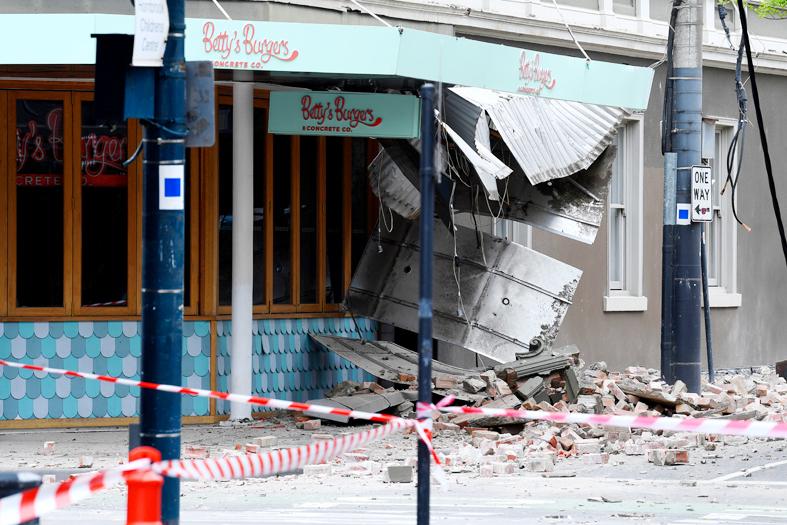A rare earthquake rattled southeastern Australia early yesterday, shaking buildings, knocking down walls and sending panicked Melbourne residents running into the streets.
The shallow tremor hit east of the nation’s second-largest city just after 9am and was felt hundreds of kilometers away.
The US Geological Survey put the magnitude of the quake at 5.8, later revised up to 5.9, and said it struck at a depth of 10km.

Photo: EPA-EFE
With Melbourne beginning its eighth week of COVID-19 pandemic lockdown and bracing for a third straight day of violent anti-vaccine protests, most residents were at home when the quake struck.
Zume Phim, 33, owner of Melbourne’s Oppen cafe, said he rushed onto the street when the quake hit.
“The whole building was shaking. All the windows, the glass, was shaking — like a wave of shaking,” Phim said. “I have never experienced that before. It was a little bit scary.”
In a popular shopping area around Melbourne’s Chapel Street, masonry debris tumbled from buildings and littered the roads. Bricks and rubble surrounded Betty’s Burgers and large sheets of metal hung off the restaurant awning.
“We were fortunate that nobody was in the restaurant at the time,” the restaurant wrote on Facebook.
Sizeable earthquakes are unusual in Australia.
“It was quite violent, but everyone was kind of in shock,” cafe worker Parker Mayo, 30, said.
At magnitude 5.9, it was “the biggest event in southeast Australia for a long time,” said Mike Sandiford, a geologist at the University of Melbourne. “We had some very big ones at magnitude 6 in the late 1800s, though precise magnitudes are not well known.”
A quake of this size is expected every “10, 20 years in southeast Australia, the last was Thorpdale in 2012,” he said. “This is significantly bigger.”
Geoscience Australia reported the initial quake was followed by a series of four smaller ones, ranging from magnitude 2.5 to 4.1.
Sandiford said that Australians should expect “many hundreds of aftershocks, most below human sensitivity threshold, but probably a dozen or more that will be felt at least nearby.”
The quake “would have caused many billions of dollars in damage had it been under Melbourne,” he added.
The mayor of Mansfield, near the quake epicenter, said there was no damage in the small town, but it had taken residents by surprise.
“I was sitting down at work at my desk and I needed to run outside. It took me a while to work out what it was,” Mansfield Mayor Mark Holcombe told Australian Broadcasting Corp. “We don’t have earthquakes that I am aware of — none of the locals I spoke to this morning had that experience with earthquakes here before — so it is one right out of left field.”

END OF AN ERA: The vote brings the curtain down on 20 years of socialist rule, which began in 2005 when Evo Morales, an indigenous coca farmer, was elected president A center-right senator and a right-wing former president are to advance to a run-off for Bolivia’s presidency after the first round of elections on Sunday, marking the end of two decades of leftist rule, preliminary official results showed. Bolivian Senator Rodrigo Paz was the surprise front-runner, with 32.15 percent of the vote cast in an election dominated by a deep economic crisis, results published by the electoral commission showed. He was followed by former Bolivian president Jorge “Tuto” Quiroga in second with 26.87 percent, according to results based on 92 percent of votes cast. Millionaire businessman Samuel Doria Medina, who had been tipped

ELECTION DISTRACTION? When attention shifted away from the fight against the militants to politics, losses and setbacks in the battlefield increased, an analyst said Recent clashes in Somalia’s semi-autonomous Jubaland region are alarming experts, exposing cracks in the country’s federal system and creating an opening for militant group al-Shabaab to gain ground. Following years of conflict, Somalia is a loose federation of five semi-autonomous member states — Puntland, Jubaland, Galmudug, Hirshabelle and South West — that maintain often fractious relations with the central government in the capital, Mogadishu. However, ahead of elections next year, Somalia has sought to assert control over its member states, which security analysts said has created gaps for al-Shabaab infiltration. Last week, two Somalian soldiers were killed in clashes between pro-government forces and

Ten cheetah cubs held in captivity since birth and destined for international wildlife trade markets have been rescued in Somaliland, a breakaway region of Somalia. They were all in stable condition despite all of them having been undernourished and limping due to being tied in captivity for months, said Laurie Marker, founder of the Cheetah Conservation Fund, which is caring for the cubs. One eight-month-old cub was unable to walk after been tied up for six months, while a five-month-old was “very malnourished [a bag of bones], with sores all over her body and full of botfly maggots which are under the

BRUSHED OFF: An ambassador to Australia previously said that Beijing does not see a reason to apologize for its naval exercises and military maneuvers in international areas China set off alarm bells in New Zealand when it dispatched powerful warships on unprecedented missions in the South Pacific without explanation, military documents showed. Beijing has spent years expanding its reach in the southern Pacific Ocean, courting island nations with new hospitals, freshly paved roads and generous offers of climate aid. However, these diplomatic efforts have increasingly been accompanied by more overt displays of military power. Three Chinese warships sailed the Tasman Sea between Australia and New Zealand in February, the first time such a task group had been sighted in those waters. “We have never seen vessels with this capability